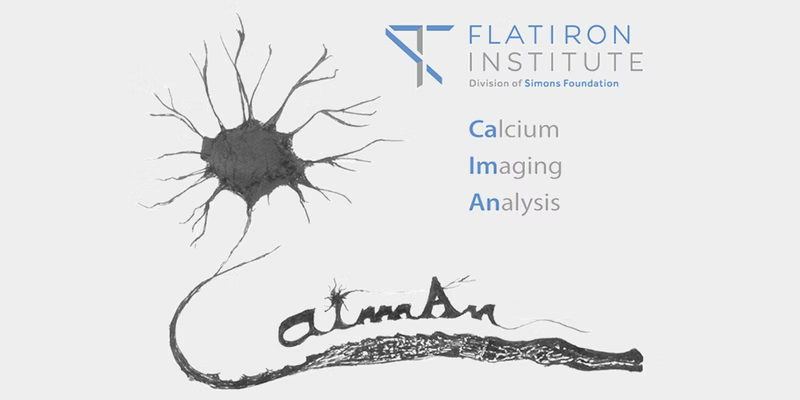
Workshop Description
New imaging modalities - including endoscopic and multiphoton calcium imaging, and single and multiphoton voltage imaging, among others - have granted unprecedented access to the activity of large neuronal populations with high temporal resolution. As such, those methods have been instrumental in obtaining new neurobiological insights inaccessible to other recording modalities. However, the barrier to establishing reproducible and efficient computational pipelines for imaging datasets, along with the difficulty of integrating this technology into real-time experiments, have substantially slowed progress in neuroscience and represent a huge opportunity cost for many laboratories.
CaImAn is an open-source software platform that provides optimized and scalable routines to preprocess imaging data with the goal of extracting the activity of each neuron. CaImAn handles multiple imaging modalities (voltage, calcium, endoscopic, multiphoton, volumetric) and analysis settings (batch/offline vs online/real-time). Mesmerize is a graphical user interface to CaImAn that allows for efficient and streamlined analysis using CaImAn algorithms, and enables users with minimal programming experience to use CaImAn effectively. CaImAn is very popular among neuroscientists world-wide, but its widespread dissemination, the efficient use of its routines, and the opportunities provided by Mesmerize, require access to training opportunities. We will address this challenge by establishing a workshop at the Flatiron Institute, Simons Foundation.
The workshop will be of interest to imaging researchers at many levels of experience. It will provide a unique opportunity to directly learn from lead developers of both CaImAn and Mesmerize for analysis of calcium and voltage data. Attendees will receive:
-
Instruction on the Python data science stack, which will be provided in research materials leading up to the conference, as well as a brief overview on the first day of the workshop.
-
Tutorials on the most cutting edge calcium and voltage imaging analysis tools available.
-
Hands-on training with real data sets and practical code examples that they will be able to use with their own data.
-
Training on how to use a new graphical user interface (Mesmerize) to streamline the entire analysis process.
-
More experienced users and developers will have the opportunity to participate in a hackathon, make contributions to the core packages, and become active contributors to these tools moving forward.
There is no charge to attend the workshop. Each day, meals will be provided for everyone and accommodations will be provided for non-local participants. Travel grants will be offered to individuals whose participation furthers the goal to promote diversity in systems and computational neuroscience, in particular among populations underrepresented in the scientific workforce as defined by NIH, including but not limited to racially underrepresented individuals, women, individuals with disabilities and individuals from disadvantaged backgrounds.
Learning Objectives
-
Learn the fundamentals of the calcium/voltage imaging analysis package CaImAn
-
Background and principles, including:
-
PCA
-
Nonnegative matrix factorization
-
Optimization
-
-
How to install and use the software with a provided data set
-
-
Learn Mesmerize, a graphical user interface (GUI) for CaImAn
-
Loading and viewing data in the GUI
-
Running motion correction algorithms
-
Batch processing to maximize efficiency.
-
Downstream analysis of extracted signals
-
-
Practical data analysis with users' own data
-
Half-day "bring your own data" session for hands-on experience
-
-
Learn to adapt Mesmerize and CaImAn to individual researcher needs
-
Instructions on how to use Github to contribute
-
Overview of the architecture of Mesmerize for contributors
-
Half-day hackathon for hands-on experience making contributions
-
Target Attendees:
-
Researchers with some programming experience who want to enhance their understanding of CaImAn and Mesmerize software packages, and the underlying theory behind them.
-
Users with their own calcium/voltage imaging data that they want help analyzing.
-
Ideally 10 or more attendees (out of 30) that are interested in contributing to the packages.
The event will also be recorded as a reference for attendees, and for users who are unable to attend. Workshop attendance will be capped at 30 attendees. Applications to attend the workshop will be accepted through midnight on Sunday, April 10, and admitted attendees will be notified by Friday, April 15; persons who applied for travel grants will also be notified by April 15. Acceptance of admittance will be required by Friday, April 22 to help ensure full attendance and to allow time for travel arrangements.
Organizers
- Dr. Mitya Chklovskii, Group Leader, Neural Circuits and Algorithms Group, CCN
- Dr. Andrea Giovannucci, Assistant Professor of Neural Engineering and PI of the Neural Engineering Laboratory, North Carolina State University
- Kushal Kolar, Doctoral Candidate in Neuroscience, University of North Carolina at Chapel Hill
- Dr. Eric Thomson, Bioinformatics Scientist, National Institutes of Health
Teaching Assistants
- Arjun Putcha, Undergraduate Research Assistant and Bioengineering and Biomedical Engineering degree candidate, University of North Carolina at Chapel Hill
- Changjia Cai, Doctoral Candidate in Neural Engineering and Research Intern in the Neural Engineering Laboratory, North Carolina State University
